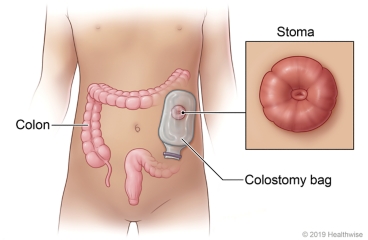Colostomy in Children: What to Expect at Home
Your Child's Recovery

Part of your child's colon has been removed or separated from the
rest of the colon. This is most often done because of a problem that
affects your child's intestines. During the colostomy, the surgeon
made a hole in your child's belly. Then the surgeon connected part
of the colon to that opening in the skin. This opening is called the
stoma.
After a colostomy you can expect your child to feel better and
stronger each day. But your child may get tired quickly at first.
Your child's belly may be sore. Your child will probably need pain
medicine after surgery. The stoma will be swollen at first. This is
normal.
Your child may have loose stools in the colostomy bag for a while.
In time the stools may become firmer. But they may be less solid
than before the surgery. Your child may also have a lot of gas pass
into the colostomy bag in the weeks after surgery. This will happen
less as your child heals.
Your child will probably need several weeks to get back to a normal
routine.
An ostomy nurse or other member of your child's care team will show
you and your child how to care for the stoma and pouch after you go
home.
This care sheet gives you a general idea about how long it will take
for your child to recover. But each child recovers at a different
pace. Follow the steps below to help your child get better as
quickly as possible.
How can you care for your child at home?

Activity

Diet

Medicines

Incision
care

Other
instructions
|
|
-
If the skin under your child's pouch is red, irritated, or
itchy, you need to treat the skin. Follow these steps.
-
Gently remove the pouch.
-
Clean the skin under the pouch with water.
-
Dry the skin.
-
Sprinkle ostomy protective powder on the skin, and
then blot it off.
-
Reattach or replace the pouch.
-
If your child keeps having skin irritation, talk to
the doctor.
|
|
|
|
|
|
|
Follow-up care is a key part of your child's treatment and
safety. Be sure to make and go to all appointments, and call your doctor
if your child is having problems. It's also a good idea to know your
child's test results and keep a list of the medicines your child
takes.
When should you call for help?
 Call 911 anytime you think your child may need emergency
care. For example, call if:
Call 911 anytime you think your child may need emergency
care. For example, call if:
Call your doctor now or seek immediate medical care if:
Watch closely for changes in your child's health, and be sure to
contact your doctor if your child has any problems.
Current as of: July 26, 2023
Content Version: 14.0
Care instructions adapted under license by your healthcare professional. If you have questions about a medical condition or this instruction, always ask your healthcare professional. Healthwise, Incorporated disclaims any warranty or liability for your use of this information.